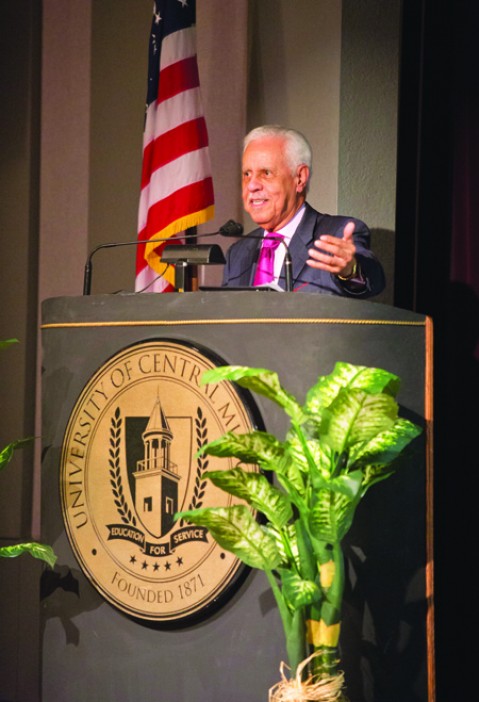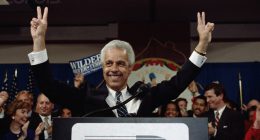It’s always good to be back in Missouri, and I am quite happy to be spending this holiday, the commemoration of Martin Luther King’s birth, with the University of Central Missouri family.
And while we are here to celebrate King’s legacy — and by extension the legacies of the giants upon whose shoulders King stood — I want to start our talk well before Dr. King’s birth 84 years ago in January of 1929. I want to start today by reciting text that will be quite familiar to the bright minds that comprise the UCM family. I promise you’ll recognize it instantly:
“We hold these truths to be self-evident, that all men are created equal, that they are endowed by their Creator with certain inalienable Rights, that among these are Life, Liberty and the pursuit of Happiness.–That to secure these rights, Governments are instituted among Men, deriving their just powers from the consent of the governed …”
You all know where to find those words assembled in such majestic and sweeping beauty — in the Declaration of Independence. They were written by a man from my home state of Virginia and a man for whom the capital of this state is named, Thomas Jefferson.
He was very much so right. It is self-evident that all men are created equal of equal rights, and that a just government derives its powers from those people over whom it exercises dominion.
Jefferson’s words helped launch the American experiment that continues today, and by extension, those words still continue to launch (and sometimes relaunch) projects of freedom and democracy around the globe.
Yet, Jefferson and those of his time would be shocked that a person of colored descent — one with a college education, no less — was standing before you today as the speaker for this event honoring another man of colored descent who has his own national holiday.
And even though he wrote those timeless words that still inspire millions, 237 years later Jefferson and the men of his day would find it unimaginable that I, as an African American, was elected to the same office that he held as governor of the Commonwealth of Virginia.
They got the sentiments right in 1776 … sentiments that resonated in ways they could not imagine — but they got many subsequent actions wrong:
– Only white men of means could vote, hold property, or exercise a political voice
– Women were allowed no official role in the governance of public affairs
– Human beings of African descent were nothing more than chattel.
How on Earth do those realities fit into a nation that announced its very existence upon the right reason that all men are created equal by a creator who has endowed each person born with a list of rights that includes life, liberty, and the pursuit of happiness?
Those realities don’t fit. And they couldn’t ever fit.
Jefferson was a slave owner, but his eloquence in announcing the people of this nation would no longer bow to a monarch an ocean away also gifted generations of Americans born after him the notion that we are uncomfortable and feel unworthy when we do not live up to the words he wrote.
It has been a difficult journey to make the Declaration’s pronouncement of universal birthright freedom for Americans a broader reality, but the people of this nation continue to push themselves to live up to Jefferson’s words.
Even when it is not easy … even when our loudest neighbors shout the forward thinking down … even when a Civil War had to be fought … even when Constitutional Amendments had to be passed … even when attorneys general and courts had to remove government officials from schoolhouse doors …
Even in those instances of difficulty, the Declaration’s words have pushed us as a nation to make our union more perfect — and as Americans, while it often takes longer than it should, we try move in the direction that the Declaration’s words point us.
Suffrage is no longer reserved for the landholding elite. We are expressly disallowed to own another human being. Women not only have the right to vote, but this state has seen two serve it in the United States Senate. As I noted earlier, I followed Jefferson as chief executive of Virginia after a vote of the people. And a man of African heritage was chosen twice by the citizens of this nation to follow Jefferson as the holder of the title, “president of the United States.”
So are we the globe’s perfect union? No. But I debate anyone to claim our progress as a nation is nonexistent, because that is not true.
Yet, I also defy those who think we can claim victory, and bask in a majestic 21st-century American self-actualization. That is just not the case. To do so would be nationally delusional.
We have too many children who need food. We have too few women wielding influence in the halls of power. We are still coming to grips with the need to treat gay citizens equally. We have a ways to go in our full embrace of America’s growing Hispanic population. We have too few minorities who have trod the electoral ground that men such as Massachusetts Governor Deval Patrick, Louisiana Governor Bobby Jindal, and President Barack Obama have walked. We have too many citizens in need of jobs and proper health care for anyone in this nation to get comfortable and settle for only the level of progress America has made since 1776.
We prize this nation’s mores and values that push us continually to live up to the ideal of freedom — sometimes despite ourselves — but they are not easy or to be taken as a given. We must work toward them every day, otherwise they will wither.
No isolated event — no single election or bill passed — can or will cement freedom and equality on its own.
Let’s take for example Abraham Lincoln’s Emancipation Proclamation, which followed Jefferson’s Declaration of Independence 87 years later. As vital as the Proclamation was, it took generations of fighting and effort on the part of Americans, black and white — some of whom lost their lives during the struggle — before the Emancipation Proclamation’s words found real effect in the lives of many former slaves’ children and grandchildren. And we still have progress to be made.
This truly is a continuing project in national community building that none of us has any right to cease. The question of the next few decades is how to march forward during this ongoing struggle. And struggle we will, and struggle we must to keep realizing our rights as inalienable and more universal.
But we must be mindful of the consequences that follow our drive to find the right and just direction to leave the next generation and those that will follow it.
We, as a people, are in the process of making monumental decisions about what this country will look like in the future.
Especially affected by those decisions we make will be citizens of the least means — the poor, of which people of color disproportionately represent. These are the people least likely to have lobbyists roaming legislative or executive branch corridors on their behalf.
How will changes in Social Security, Medicare, Medicaid, national health care, immigration, the representativeness of the judges who make up our courts, mental health care, firearms policy, and education impact the poor and people of color?
What is the responsibility of government to determine, prevent, and reduce the adverse impact of its social policies?
That is a conversation we as a nation must have — most decidedly in an hour of transition such as this.
Will we turn our hearts to those in the most need? Will we be indifferent to how the policies that are instituted will affect those still fighting to participate more fully in the American Dream? And if we do, is that an America still striving to prove that all men are created equal?
I would dare say the answer is, “no.”
But at the state and local level, we see anachronistic patterns of thought and approaches to policy being replaced by downright unimaginable and unfair policies that will lead — perhaps unintended — away from viable solutions to the needs of both the wealthy and the poorest.
We see the results of federal, state and local policies that are nothing short of disastrous: decreased interest in voting, decreased ability to vote, increased poverty, decreased homeownership, homelessness, increased health care costs, decreased ability to seek the protection of bankruptcy for a fresh start, unfair court sentencing, untreated illnesses, and substandard housing. All buffeting the belief that collective action through government is not just ineffective, but harmful instead.
When one looks to Washington, it’s not hard to yearn for a different era of leadership. But even more than that, this nation needs a better understanding of what policies are necessary for all Americans to live on an equal plain of opportunity and to have an equal stake in the country.
Traditionally disenfranchised Americans — those of African, Native American, Asian, and Latino descent — often are viewed by the well to do as living in a self-imposed exile of socioeconomic despair. That is not true. Government’s policies matter. It chooses winners and it can create losers. We must be mindful as a nation to impose public-policy prescriptions that can spread equal opportunity beyond today’s version of the landed elite for whom rights of Jefferson’s description were reserved.
Our public policies are the method by which we distribute and provide access to the vital societal resources that determine life’s chances and quality.
As we decide what those policies will be for the future, we must have governmental actors who understand that. We must have governmental leaders who remember that this nation’s instruments of democracy promise fairness and equality to all citizens — not just the ones who can pay the most talented lawyer-lobbyists money can buy.
No … instead government must allow people — black, white, and all colors of the human rainbow — the tools to stand and take a responsible role in the daily life of the nation. But do our policies always provide for that?
I found a shocking statistic, one that we all need to share with any and everyone who will listen: Former slaves, those freed by President Lincoln’s Emancipation Proclamation on January 1, 1863, could read and write at a higher rate 15 years after the ending of the civil war than their descendants can today.
That is a damning and downright unacceptable fact. We cannot sustain a nation that strives to stand for justice and opportunity for all if that remains true. We can’t generate economic power for all if that remains true. Equality for no one in this nation — no matter his or her skin color — is secure if that remains true.
We can do better than that, and we must. Doing so is properly living up to our responsibility to protect the idea that is America.
Federal and state government sanctions of the injustices that were slavery, segregation and racial hegemony are long past, mainly thrown to the trash heap by the nation’s courts during the latter part of the 20th century for being un-American. But the effects of those policies still linger today in the lives and communities of families who are the descendants of those formerly affected by those policies. And they are being joined by other populations who now are moving to and making this country home.
We killed the policies and burned them after we removed them from the codebooks, but have we fully done the work of undoing their vestiges of inequality? That is where public policy must step in. It can’t be indifferent to America’s past … it must be deliberate in reversing our course.
We live in a country where each citizen can affect the direction of the change we need by being clear in demanding a proper vision and unity in how national evolution occurs. It does not and will not happen by chance.
There is no automatic mechanical progression that leads America to being a better nation tomorrow than it is today, than it was last year, than it was last century. That has happened because our people have demanded we do better.
There has been and there still is a socioeconomic and racial divide that reflects itself in our social policies and governmental practices. How we deal with that and if we move beyond it is the true American question. It has and will continue to define who we are. It is how one generation has handed a better nation off to its successors.
The story is told about the prophet Abraham being informed by his sons that the wells of water that were so essential to their existence had dried up. The sons felt hopeless and forsaken. Abraham exhorted them “to re-dig the wells our fathers have dug.”
Who are we and who do we want to be?
This is a nation where slaveholders thundered that all men were created equal, and whose descendants fought a civil war to prove the words of an older generation true.
“We hold these truths to be self-evident, that all men are created equal …”
Let us continue to work together through public policy to prove Thomas Jefferson right. That is my challenge to you. That is your responsibility as Americans.
Dr. King took up that mantle and laid his life down doing what the Declaration challenged him to do as a citizen.
He lived up to the American legacy left for him.
You don’t have to give your life for that cause, but you must live an engaged life to further our American ideal.
This is no time for despair or cynicism. This is a time of transition through which we must re-dig our wells.
Remarks originally were made during a keynote address as part of the University of Central Missouri’s Dr. Martin Luther King Jr. Freedom Scholarship Dinner on January 22, 2012.







